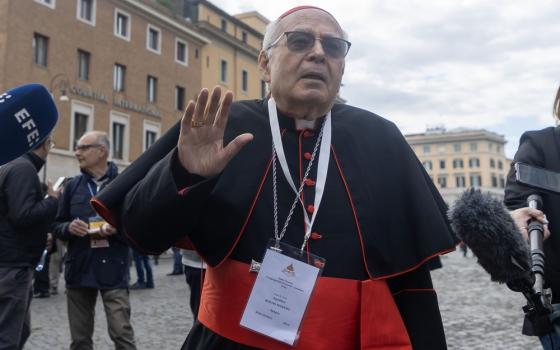In a previous blog, I noted a clear contradiction in the document " 'Sensus Fidei' in the Life of the Church" from the International Theological Commission. On the one hand, it was a marvelous endorsement of the sense of the faith, especially among the laity in history and theology. On the other hand, the position of the magisterium crept into the document in several places, as if to reassert its supreme authority. Some who read my blog dismissed " 'Sensus Fidei' in the Life of the Church" as just another reminder of who's really in charge. But that misses the real substance of the document. I do not believe anything like it could have been published during the papacies of John Paul II or Benedict XVI. The case for the laity's role in decision-making is set out as never before -- and this with the blessing of Cardinal Gerhard Müller, head of the Congregation for the Doctrine of the Faith.
Here are some excerpts from the document.
"The faithful have an instinct for the truth of the Gospel, which enables them to recognise and endorse authentic Christian doctrine and practice, and to reject what is false. That supernatural instinct, intrinsically linked to the gift of faith received in the communion of the Church, is called the sensus fidei."
The writers of this document are very conscious of the development of doctrine and the influence of the laity in this process. For example: "Between canon 20 of the Council of Elvira (c. 306 AD), which forbade clerics and lay people to receive interest, and the response ... of Pope Pius VIII to the bishop of Rennes [a period of some 1,500 years] there is a clear development of teaching, due to both the emergence of a new awareness among lay people involved in business as well as new reflection on the part of theologians with regard to the nature of money."
The writers propose with apparent approval the position of John Henry Newman concerning the Arian dispute. From the Council of Nicaea in 325 to the Council of Constantinople in 381, they note, "there continued to be uncertainty among the bishops. During that period, 'the divine tradition committed to the infallible Church was proclaimed and maintained far more by the faithful than by the Episcopate'. '[T]here was a temporary suspense of the functions of the 'Ecclesia docens' [the teaching Church]. The body of Bishops failed in their confession of the faith."
They cite Thomas Aquinas' position that the faithful, "even without theological competence, can and even must resist, by virtue of the sensus fidei, his or her bishop if the latter preaches heterodoxy. In such a case, the believer does not treat himself or herself as the ultimate criterion of the truth of faith, but rather, faced with materially 'authorised' preaching which he or she finds troubling, without being able to explain exactly why, defers assent and appeals interiorly to the superior authority of the universal Church."
They approve Pope Pius IX's decision to proceed with the definition of the Immaculate Conception only after he required "the bishops of the world to report to him in writing regarding the devotion of their clergy and faithful people to the conception of the Immaculate Virgin."
They recall how strongly theologians emphasized the sensus fidei in the life of the church leading up to the Second Vatican Council. "Banishing the caricature of an active hierarchy and a passive laity, and in particular the notion of a strict separation between the teaching Church ... and the learning Church ... the council taught that all the baptised participate in their own proper way in the three offices of Christ as prophet, priest and king."
They stress Lumen Gentium's description of "how Christ exercises his prophetic office not only through the Church's pastors, but also through the lay faithful. It teaches that, 'until the full manifestation of his glory', the Lord fulfills this office 'not only by the hierarchy who teach in his name and by his power, but also by the laity'. With regard to the latter, it continues: 'He accordingly both establishes them as witnesses and provides them with the appreciation of the faith and the grace of the word'."
The sensus fidei is also evoked in the council's teaching on the development of doctrine, they note, in the context of the transmission of the apostolic faith. "Dei Verbum says that the apostolic Tradition 'makes progress in the Church, with the help of the Holy Spirit'. 'There is a growth in insight into the realities and words that are being passed on', and the council identifies three ways in which this happens: 'through the contemplation and study of believers who ponder these things in their hearts'; 'from the intimate sense of spiritual realities which they experience'; and 'from the preaching of [the bishops]'."
"It is therefore important to reflect also on the function played by the laity in discerning the Christian understanding of appropriate human behaviour in accordance with the Gospel," they state. "In certain areas, the teaching of the Church has developed as a result of lay people discovering the imperatives arising from new situations. The reflection of theologians, and then the judgment of the episcopal magisterium, was based on the Christian experience already clarified by the faithful intuition of lay people."
They are aware of difficulties that may arise but see the solution as coming from mutual cooperation. "There are occasions, however, when the reception of magisterial teaching by the faithful meets with difficulty and resistance, and appropriate action on both sides is required in such situations," they explain. "The faithful must reflect on the teaching that has been given, making every effort to understand and accept it. Resistance, as a matter of principle, to the teaching of the magisterium is incompatible with the authentic sensus fidei. The magisterium must likewise reflect on the teaching that has been given and consider whether it needs clarification or reformulation in order to communicate more effectively the essential message."
We have in this document is a full-blown appreciation of the sense of the faith and the sense of the faithful coming from the International Theological Commission. I hope it will be required reading for the bishops, especially Pope Francis. Despite the embarrassing contradictions in a few places, it could mark a major change in the way the institutional church wields its authority throughout the world.






